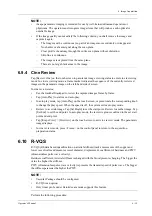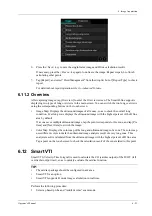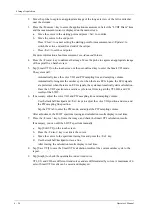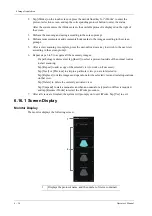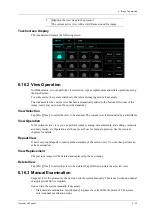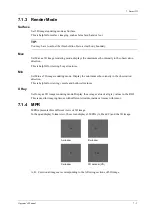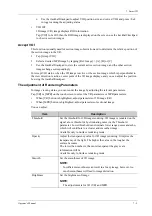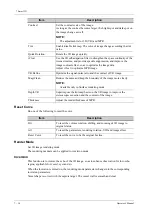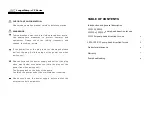
6 - 32
Operator’s Manual
6 Image Acquisition
•
[A2C]: apical two chamber.
•
[ALAX]: apical long-axis view, also called 3-chamber view.
•
[PSAX B]: short axis view of base section, short axis view of mitral valve.
•
[PSAX M]: short axis view of base section, short axis view of papillary muscle.
•
[PSAX AP]: short axis view of apex.
Parameter Adjustment
•
[Thickness]: adjusts the tracing thickness, i.e., the distance between the endocardium wall and
the tracking points on the epicardium.
•
[Tracking Points]: adjusts the number of points within the segment.
•
[Cycle]: select the next cycle.
•
[Display Effect]: turns on/off the arrow vector graphical display of the myocardial movement.
•
[Velocity Scale]: adjust the scale length of the velocity.
•
[Display Style]: display the endometrial, the epicardium, the myocardial or all.
•
[Tracking Cycles]: select the cycles to be tracked.
•
[Average Cycles]: obtain the average parameter curves of the tissue.
•
[Cycle Select]: select among different cycles.
Time Mark
According to the status of the current section, tap the corresponding key on the touch screen to
check the matching time.
•
[AVO]: displays aortic valve open time.
•
[AVC]: displays aortic valve closure time.
•
[MVO]: displays mitral valve open time.
•
[MVC]: displays mitral valve closure time.
Curve Display
Select [Parameter], the system provides different curves of different segments for observation.
•
General
–
Speed curve: The X-axis represents time (s); the Y-axis represents velocity (cm/s).
–
Displacement curve: The X-axis represents time (s); the Y-axis represents displacement
(cm).
•
Long axis section
–
Volume: The X-axis represents time(s); the Y-axis represents volume (ml).
–
Strain curve (Longitudinal, Transversal): The X-axis represents time (s); the Y-axis
represents strain deformation of the tissue (%).
–
Strain-rate curve (Longitudinal, Transversal): The X-axis represents time (s); the Y-axis
represents strain by time (s
-1
).
•
Short axis section
–
Area curve: The X-axis represents time(s); the Y-axis represents area (cm2).
–
Strain curve (Radial, Circumferential): The X-axis represents time (s); the Y-axis
represents strain deformation of the tissue (%).
–
Strain-rate curve (Radial, Circumferential): The X-axis represents time (s); the Y-axis
represents strain by time (s
-1
).
–
Circumferential Rotation curve: The X-axis represents time (s); the Y-axis represents
rotation of the tissue (Deg).
Summary of Contents for Anesus ME7T
Page 2: ......
Page 58: ...This page intentionally left blank ...
Page 154: ...This page intentionally left blank ...
Page 164: ...This page intentionally left blank ...
Page 182: ...This page intentionally left blank ...
Page 190: ...This page intentionally left blank ...
Page 208: ...This page intentionally left blank ...
Page 254: ...This page intentionally left blank ...
Page 264: ...This page intentionally left blank ...
Page 280: ...This page intentionally left blank ...
Page 311: ......
Page 312: ...P N 046 018839 00 5 0 ...


